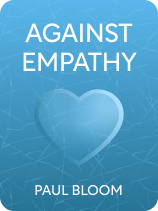

This article is an excerpt from the Shortform book guide to "Against Empathy" by Paul Bloom. Shortform has the world's best summaries and analyses of books you should be reading.
Like this article? Sign up for a free trial here.
How can empathy get in the way of treating others well? What truly motivates us to care for people?
In Against Empathy, psychologist Paul Bloom asserts that we don’t have to empathize with someone to treat them kindly. In fact, we often shouldn’t empathize. He discusses several other emotions and desires that should be at work instead.
Read more to learn how to be kind to others—without employing empathy.
How to Be Kind to Others
Bloom argues that we can be kind and compassionate people without making empathy a part of our decision-making process. This idea breaks down into three insights: that there are multiple emotions that enable kind behavior, that care is better than empathy at motivating kindness, and that concern motivates care. We’ll take a closer look at this formula for how to be kind to others.
First, it’s important to note that, when Bloom writes that empathy is unnecessary for kindness, he’s talking about emotional empathy as opposed to cognitive empathy. Emotional empathy involves feeling someone else’s emotions and simulating their experiences. Cognitive empathy entails a more distanced appreciation of someone else’s experiences; it involves understanding the emotions someone else is experiencing without experiencing them yourself. Bloom doesn’t oppose the practice of cognitive empathy.
Self-Control, Intelligence, & Compassion
Bloom writes that it’s not empathy but self-control, intelligence, and compassion that help us behave kindly toward others. Self-control and intelligence are relatively self-explanatory, and Bloom defines compassion as a concern for others and a desire for them to succeed.
(Shortform note: What is the source of kindness, if it isn’t empathy? It’s difficult to disentangle empathy from the capacities Bloom cites as enabling kindness. For instance, the same part of the brain that enables us to empathize with others also enables us to exercise self-control, which makes sense since self-control is like empathy for your future self. Additionally, intelligence and empathy seem correlated, and higher intelligence seems to contribute to greater concern for others. Some therapists even say that it’s more important to be kind than to be compassionate (or empathetic) because kindness is action-oriented.)
Caring
Not only does Bloom write that empathy is unnecessary to care for other people, but he also argues that we can be better, more moral people if we resist acting as empathy prompts us to. For example, when someone is in distress, it can sometimes be more helpful if we can react calmly and rationally rather than taking on the other person’s distress. That way, our ability to understand the situation and problem-solve won’t be hindered by our emotions.
Bloom points out that we feel happy when someone we love is happy and sad when someone we care about is sad, not because our emotions mirror the other person’s, but because they arise from our care for the other person. He also points out that our emotions can actually get in the way of sharing someone else’s happiness, such as when we’re envious of the accomplishment that’s made them happy, in which case it’s better not to rely on our emotions.
(Shortform note: Psychologist Jamil Zaki characterizes Bloom’s idea of emotions as a volatile force in our relationships as outdated. Zaki explains that researchers now understand that we work with, not against, our feelings. By believing that empathy is under our control, we can work harder to apply it in ways that fit our social and moral goals. According to Zaki, we should align empathy with morality, and behaving morally requires using both emotions and reason.)
Concern
Another reason that we don’t need empathy to act with kindness is that it’s not actually empathy, but concern, that motivates us to care for other people. The pressures of natural selection motivate altruistic behavior because it’s evolutionarily advantageous for us to care for those who share our genes. So, Bloom explains, human evolution has equipped us with a fundamental concern for other people’s welfare. This evolved capacity for concern (rather than empathy) is what motivates us to care for others.
(Shortform note: Empathy is often cited alongside other motivations in theories on the evolution of altruism. In The God Delusion, evolutionary biologist Richard Dawkins writes that altruism, kindness, and empathy all have Darwinian roots. The drive to ensure our genes survive motivates altruism within a kin group. But another evolutionary mechanism called the “reciprocity reflex” explains empathy toward those who don’t share our genes: We’re wired to help others who have helped us. Dawkins writes that this reciprocity, in which empathy plays a part, holds societies together.)

———End of Preview———
Like what you just read? Read the rest of the world's best book summary and analysis of Paul Bloom's "Against Empathy" at Shortform.
Here's what you'll find in our full Against Empathy summary:
- How the conventional understanding of empathy gets it wrong
- How empathy can motivate us to act in unjust, irrational, and cruel ways
- Why we should practice rational compassion instead of empathy






